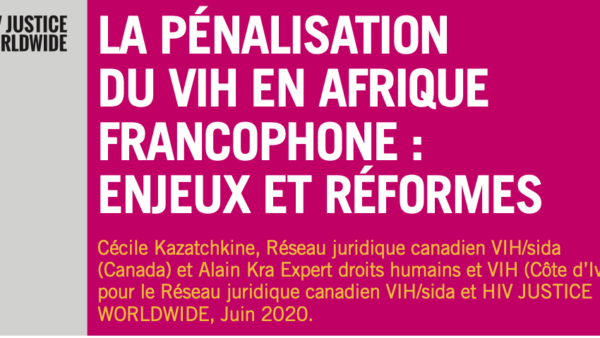Overview
Cote d’Ivoire’s HIV-specific criminal law provides for an obligation to disclose one’s HIV status to one’s sexual partner. Prosecutions based on the law can also occur where actions may have included a possible exposure to HIV with no transmission alleged. Intention to transmit HIV or to cause harm is not required in the case of negligence.
However, the law provides a list of circumstances that would preclude criminal liability: No one can be prosecuted where transmission or exposure results from: mother-to-child transmission; an act that does not carry any significant risk; when the person living with HIV was not aware of their status; their partner had been informed; and/or if condoms were used. It also precludes cases of alleged non-disclosure if the person living with HIV was afraid of coming to serious harm by disclosing their status to their partner.
To our knowledge, there have been no reported cases of HIV criminalisation to date.
Laws
Act No. 2014-430 of 14 July 2014 on prevention, protection and repression in the fight against HIV and AIDS
Article 11: Every person living with HIV is required to disclose his or her HIV status to his or her spouse and sexual partners as soon as he or she becomes aware of it.
Care services must provide all the psychosocial support necessary for the person living with HIV to make the announcement to his or her spouse or sexual partners.
In particular, the healthcare provider must ensure that the announcement is made and that the means used are adapted to any difficulties in communication and understanding of the person concerned, his or her spouse and sexual partners.
Article 48: Anyone who, knowing that he or she is HIV-positive, engages in sexual intercourse with the intention of transmitting it to others shall be punished by imprisonment for a term of 5 to 10 years.
The penalty is imprisonment from 5 to 20 years if the sexual relations are committed without the victim’s consent or if the victim is a minor or incapable adult.
Article 49: Anyone who knowingly inoculates others with HIV-infected substances in any manner whatsoever, regardless of their use or administration and regardless of the consequences, shall be punished by imprisonment from 5 to 20 years.
Article 50: Anyone who, through carelessness, inattention or clumsiness, causes another person to become infected with HIV by his or her act or activity shall be punished by imprisonment of one month to one year and a fine of 50,000 to 500,000 francs.
Penalties are doubled if the infection to others results from negligence or non-compliance with regulations.
Article 51: No one shall be prosecuted or tried under this or any other law for HIV transmission or exposure where such transmission or exposure results from any of the following:
– mother-to-child transmission of HIV before birth, during delivery or during breastfeeding;
– an act that does not pose a significant risk of HIV transmission;
– a person living with HIV who did not know his or her positive HIV status at the time of the act;
– a person living with HIV who has practiced safe sex, including condom use;
– a person living with HIV who has informed his or her sexual partner or any other person of his or her HIV status before the act involving a significant risk of HIV transmission;
– a person living with HIV who has not informed his or her sexual partner because of fear of reprisals.
Further resources
The evaluation of the legal framework for the protection of HIV rights (LEA) is presented as a follow-up activity to the recommendations and conclusions of the Global Commission on HIV and Human Rights in Côte d'Ivoire. The overall objective is to promote a legal environment that promotes an effective law-based response to HIV in the Republic of Côte d'Ivoire.
Document in French
Acknowledgements
Report presenting the results of a survey on HIV criminalization in African countries where French is spoken, conducted from May to September 2017.
Authors: Stéphanie Claivaz-Loranger & Cécile Kazatchkine for the Canadian HIV Legal Network and HIV JUSTICE WORLDWIDE
HIV Justice Network's Positive Destinations
Visit the Cote d'Ivoire/Ivory Coast page on Positive Destinations for information on regulations that restrict entry, stay, and residency based on HIV-positive status, as well as access to HIV treatment for non-nationals.
